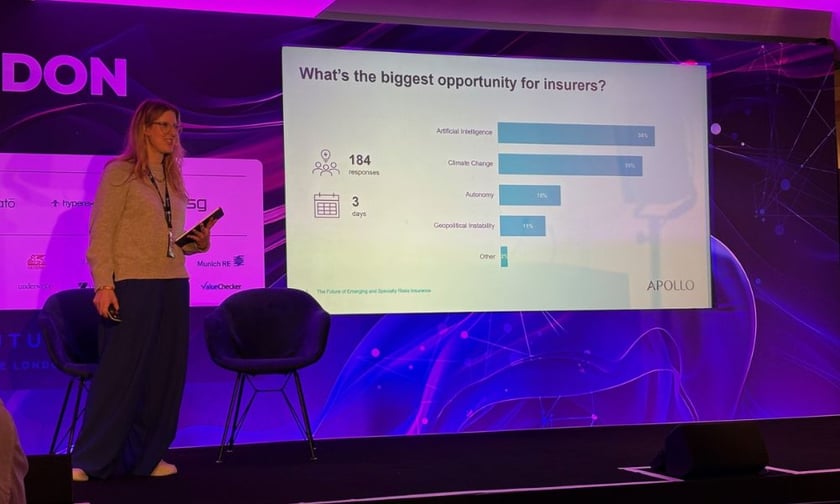

With artificial intelligence (AI) quickly permeating every facet of business and society, is it time for specialized insurance coverage for organizations?
AI was a strong talking point at the inaugural ITC London this week (Jan. 27 and 28). Technology and insurance leaders agreed on the transformative potential of AI but raised challenges associated with its widening use – challenges that traditional insurance policies may not adequately address.
In a presentation, Apollo Underwriting class leader for innovation Hayley Budd (pictured) said AI posed a major opportunity for insurers in two ways: The opportunity for insurers to leverage AI in their underwriting, risk scoring, operational efficiencies, and claims handling; and the risks that will arise from people using AI, and the need for new insurance products to cover those risks.
Budd noted the ongoing debate over the latter. She said some companies might believe existing policies, like cyber, general liability, or errors and omissions (E&O) insurance, will provide sufficient protection. In reality, Budd said, these policies often lack the specificity to address AI’s unique challenges.
“As AI use cases expand and issues arise, we’ll see these policies tested,” she said. “Insurers might adjust coverage, exclude certain risks, or offer specific endorsements – similar to what we saw in cyber insurance.”
A few carriers and tech firms have already started dipping into specialized AI insurance solutions. For example, last year, AXA XL launched an endorsement to cover businesses developing their own generative AI (gen AI) models.
The need for specific AI coverage entered the spotlight last year after a civil tribunal ruled Air Canada was liable after its AI chatbot gave a passenger misleading information that led him to pay for full-price airfare.
Canada’s largest airline was ordered to pay damage to the passenger, Jake Moffatt, who said he was assured by the chatbot that he could book a full-fare flight for his grandmother's funeral and then apply for a bereavement fare later.
Air Canada argued that Moffatt should have gone to the link provided by the chatbot, where he would have seen the correct policy. The tribunal rejected the argument. The airline attracted further criticism for attempting to distance itself from the error, alleging the chatbot was “responsible for its own actions.”
Budd said there was no insurance product existing to cover that liability, and cyber policies didn’t apply, highlighting a gap that the insurance industry must address, especially as AI evolves.
“The question of whether we’ll need dedicated AI insurance towers or verticals depends on usage,” Budd said. “A small business using AI through a vendor might expect the vendor to carry insurance, while AI vendors themselves may need specialized policies to protect against lawsuits.
What are your thoughts on specialized AI insurance coverage? Do you think we’ll soon see a lot of innovation in this space? Please share a comment below.
